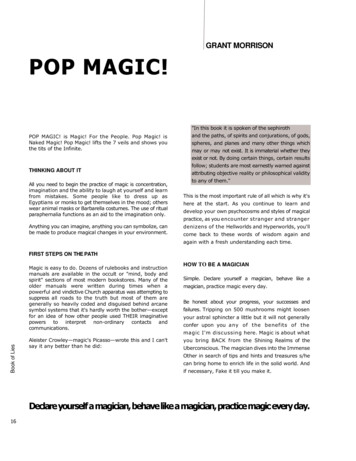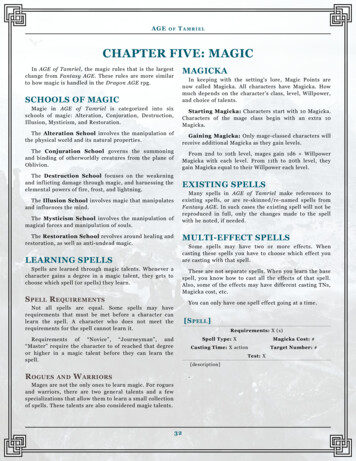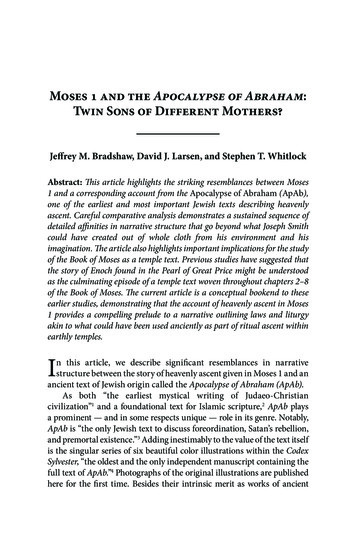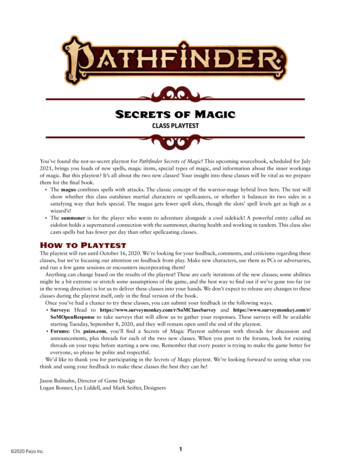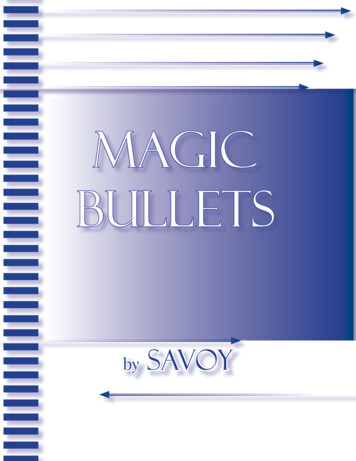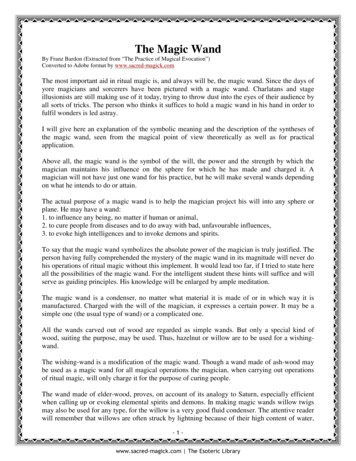
Transcription
Prof. Scott B. NoegelChair, Dept. of Near Eastern Languages and CivilizationUniversity of Washington"Moses and Magic: Notes on the Book of Exodus."First Published in:Journal of the Ancient Near Eastern Society 24 (1996), 45-59.
{y-Moses and Magic:Notes on the Book of ExodusSCOTT B. NOEGELRice UniversityThe scholarly world has known for some time that the book of Exodus demonstrates a first-hand knowledge of Egyptian customs and beliefs, even if somewhattendentiously related.l This is especially apparent in the account of the ten plagues,which some see as representing an attack against the Egyptian pantheon,2 and in theaccount of Moses' first appearance before Pharaoh's magicians (Exod. 7:8-12). Regarding the latter, for example, not only does the word C' I 'n, "magicians," derivefrom Egyptian bry-tp "lector priest, magician,"3 but the trick of turning a staff intoa serpent has parallels both in Egyptian literature, in the so-called "wax crocodilestory," and in the repertoire of Near Eastern snake charming tricks.4 In addition,J. Currid has demonstrated convincingly that, far from being theologically troubling,the frequent "hardening (lit., making heavy) of Pharaoh's heart:' is a polemical playon the Egyptian belief that Pharaoh's heart would be weighed against the feather oftruth before entering the afterlife.sWhile scholars often rightly note the theological polemic behind such allusions,namely the subordination of Egyptian magic and belief to the God of Israel. to myknowledge, no effort has been made to understand the magicians' tricks and theirsubsequent failures from the perspective of Egyptian magic.6 Nevertheless, as I shalldemonstrate, a knowledge of Egyptian magical practice greatly enhances our understanding of the confrontation between Moses and Pharaoh. Therefore, in what follows I shall delineate and discuss several aspects of the Exodus account in the lightof their linguistic and thematic affinities with Egyptian magic.I. See. e.g., J. K. Hoffmeier,"The Arm of God Versus the Arm of Pharaoh in the Exodus Narratives:'Bib. 67 (1986), 378-87. For linguisticTestament." JAOS 73 (1953). 144-55.parallels.see T. O. Lambdin.2. See, e.g. Ziony Zevit. "Three Ways to Look a the Ten Plagues,""EgyptianLoan Words in the Old.BR 6/6 (1990). 16-23 and more re-cently John D. Currid. "The Egyptian Selling of the 'Serpent': Confrontationin Exodus 7, 8-13:' BZ 39/2(1995),203-24.3. A. S. Yahuda, The Language of the Pentateuch in Its Relation to Eg.'ptian (London, 1933),93-94;Jan Quaegebeur, "On the Egyptian Equivalent of Biblical f:lar{ulllmim:' in Sarah Israelit-Groll. cd., Pharaonic Egypt, the Bible, and Christianity (Jerusalem.1985), 162-72.4. L. Keimer. "Histories de serpents dans l'Egypte ancienne et moderne," MIE 50 (Cairo, 1947); D. P.Mannix, "Magic Unmasked,"em (New York, 1967), 13.Holiday (Nov. 1960), 32; W. Gibson,Secretsof Magic: Ancient alld Mod-5. John D. Currid, "Stalking Pharaoh's Heart: The Egyptian Background to the Hardening of Pharaoh'sHeart in the Book of Exodus," BR 9/6 (1993). 46-51; "The Egyptian Setting of Ihe 'Serpent':' 216-24.6. Currid. "The Egyptian Setting of the 'Serpent'," brilliantly details the Egyptian setting of the storiesand their Egyptian parallels. but he does not deal with the particulars of Egyptian magic.45
'.46JANES 2 (1996)Before doing so, it should be stated that although the magicians' use of "spells"is contrary to Moses and Aaron's method, "which is unaccompanied by any incantation praxis,"7 this does not rule out the possibility that Moses and Aaron's acts mayhave been perceived as magic by the Egyptians, especially the magicians who weresteeped in magicallore.8 Moreover-and this will anticipate somewhat my conclusions-many of the wonders that Yahweh and Moses perform mirror Egyptian magical acts. Thus, while literarily the stories in Exodus conveyed to the Israelites atheological polemic in Yahweh's defeat over Egyptian magic and belief, they werealso not without meaning for the Egyptians, who perceived in Yahweh's wonders asignificance within the context of their own belief system. It is this double-edgedliterary sophistication that I would like to make apparent below.No doubt a lack of scholarly attention to comparisons between the Exodus account and Egyptian magic is due, at least in part, to the lack of a comprehensivestudy of Egyptian magic. It is with great pleasure, therefore, that biblical and NearEastern scholars can welcome the appearance of Robert Ritner's volume on themechanics of Egyptian magical praxis.9.While it is not my intention here to review Ritner's book, scholars should beaware that his study is a veritable goldmine of information on Egyptian magic forthe specialist and interested comparativist. The reader will recognize my debt to hisimportant study. With this new set of data at our disposal, then, let us return to Exod.7:8-12 and look anew at the events recounted from the magicians' perspective.1. The Staves and the SerpentsYahweh said to Moses and Aaron, "When Pharaoh speaks to you and says, 'Produce yourmarvel,' you shall say to Aaron, 'Take your rod and cast it down before Pharaoh.' It shall turninto a serpent {t'Jn)." So Moses and Aaron came before Pharaoh and di just as Yahweh hadcommanded: Aaron cast down his rod in the presence of Pharaoh and his courtiers, and itturned into a serpent. Pharaoh, for his part, summoned the wise men and the sorcerers: andthe magicians (O'7J' 'n) did the same with their spells (on'on?):each cast down his rod, andthey turned into serpents. But Aaron's rod swallowed their rods.First, it will be noticed that the event related here cannot have as its basis theoften-cited Egyptian snake charming trick which pinches the nerve on the nape ofthe snake's neck to induce paralysis, for as B. Jacob correctly observed, with thesetricks we deal "with snakes that turn into staffs, not the reverse as here-staffs whichturned into snakes!"tO Moreover, Yahweh explicitly commanded Moses to pick upthe serpent not by its head, but by its tail (Exod. 4:4).7. N. M. Sarna. iPS Torah Commentary:Exodus (Philadelphia.8. In this respect it is interesting to note that Christian traditionwisdom of the gyptians" (Acts 7:22).9. Robert K. Ritner, The Mechanics of Ancientental Civilization, 54: Chicago. IL, 1993).10. Benno Jacob, The Second(Hoboken, NJ. 1992),254.EgyptianBook of the Bible: Exodus.MagicalTrans.1991),37.recalls Moses as "learnedPracticein all the(Studies of Ancient Ori-Walter Jacob and YaakovElman
;.- . -c:". r -.:. :::. :::. .-. Q":o . 'f, ",.:::,C .L':;:. f. .L I' .".-0 .L - C. .'.-0'!;. c.'O'if1-. :::. f. 'f . ";::.f:(' "'(, .""""".Lc. (' J' ' 47Noegel: Moses and Magic(' \.---.Second, it will be noticed that the word for "serpent," rm, is not the usual wordfor this creature, and that when Yahweh prepares Moses for the confrontation withPharaoh in Exod. 4:3, and again later in 7: 15 when the event is recounted, the animal is called a u.tnJ.While to some this points to evidence of variant sources, II toothers it suggests that the rJn of 7:9 is a wholly different reptile, possibly a crocodile.l:! In turn, this reading is then used to bolster the apparent similarity to theEgyptian tale of the wax crocodile. Yet, militating against this view is Exod. 7: ISwhere I'm and u.tnJ are clearly synonyms.N. Sarna, on the other hand, has suggested that we read rm as a possible reference to Pharaoh's uraeus. According to this view, the event would represent to theking the loss of divine power and apotropaic protection.13 It is true that the rm,which elsewhere appears to mean "sea monster" or hdragon,"14 must have specialsignificance for Pharaoh, for Ezekiel addresses him as a rm in 29:3. Nevertheless,Sarna's view is problematic because the magicians perform their transformationutilizing staffs that have no connection with the uraeus, which typically belongs onPharaoh's throne and headdress.Thus, on the basis of Exod 7: 15 which relates the very same event using u.tnJ,I propose that we read rm in 7:9 as "serpent," even if it carries an additional nuance. So why the change in wording? In my opinion, rm was chosen in Exodus 7because of its strong mythological import. At Ugarit. for example, the 11111,"Tannin,"appears as a synonym of the primordial sea monster Leviathan, and its inclusion inseveral personal names suggests that the Tannin was worshipped.15 Moreover, theBible's references to the Tannin in connection with creation (Gen. 1:21) and the evilserpent whom Yahweh slew (e.g., Job 7: 12; Isa. 27: 1; 51 :9) illustrate the mythological and theological importance of the Tannin. In Egypt. too, the serpent had cosmicconnections in the form of the giant serpent Apophis, the divine enemy of Ra, whowould battle the solar deity daily as he made his circuit through the underworld.16Thus, I suggest that the change from u.tnJto pn was made in order to reflect the cosmic importance of the serpent when standing before Pharaoh's court. This would fitthe tendency in the Exodus and conquest narratives to polemicize against the theologies of its neighbors by reworking them. To cite just two examples: the parting of theSea represents a victory over Yam "Sea," and the decisive battle against the giant Ogof Bashan (Num. 21:33-35), a victory over the underworld.17 Moses' grasping ofII. I prefer to treat the text as we have it. and not according to hypothetical reconstructions.12. See. e.g. George Bush. Commentary 011Exodus (New York. 19.B; repr.: Grand Rapids. 1993).91:A. H. McNeile. The Book of Exodus (London. 1908),41: U. Cassuto. A Commentary on the Book of Exodus (Jerusalem. 1967),94; Ronald E. Clements, Exodus (Cambridge.1972).44: Robert A. Cole, Exodus:An lmroductioll and Commemary (Downers Grove. IL. 1973). 88-89; James B. Coffman. Commentaryon ExodllS: The Secolld Book of Moses (Abile, TX, 1985).87; John I. Durham, Word Bible Commentary:Exodus (Waco, TX, 1987),91: Amos Hakam, The Book of E. odus (Jerusalem.1991). III (in Hebrew).13. Sarna, Exodus. 20.14. The LXX translatesOpcilCWVin Exod. 7:9 and 5'1'\; in 4:3.IS. C. H. Gordon. Ugaritic Textbook, 498.16. Byron E. Shafer. ed., Religion in Ancient17. Yahuda. The LangllOge of the Pentateuch,Egypt (Ithaca, NY, 1991).36,41,119.131; Scott B. Noegel. "The Aegean Ogygos of Boeotiaand the Biblical Og of Bashan: Reflections of the Same Myth:' ZAW"nP'""""",,,ilo 6"'I )1 11-II1.b,
\48. :: JANES 24 (1996)the Tannin, therefore, would be no less theologically significant. as it would represent the casting down of Apophis, an act familiar to Egyptian magicians.ISAdditional support for this theological dimension comes from the verb l"ViI,"cast down," used in reference to the staves (Exod. 4:3; 7:9; 7: 10; 8; 12). The Egyptian verb for "casting down," sbr, in addition to appearing in magical exorcisms andspells, also occurs in the Apophis text in reference to the magicians who would takea wax figurine of Apophis and sbr m "cast (it) down:'19 The Egyptian magicians,therefore, would have seen Aaron's casting down of the staff as magically significant.Nevertheless, we need not con'cern ourselves with the reason that a synonymwas chosen in Exod 7:15, since there tUnJclearly functions as a synonym for T'm.2oMoreover, the Egyptians associated serpents in general with magic. Even Pharaoh'suraeus, itself an embodiment of the cobra goddess Wedjet, was believed to imbuePharaoh with magical power. For example, note the following hymn to the uraeusrecited upon Pharaoh's coronation:The doorsof the Horizonareopened,theirboltsarc slipped.He (theking)comesto thee.0 Red Crown.he comesto thee 0 FieryOne.He comesto thee,0 GreatOne;he comesto thee,0 Magician.He has purifiedhimself for thee. . .He comesto thee 0 Magician.It is Horus who has fought to protect his eye, 0 Magician.z1In fact, serpents of numerous types appear ubiquitously in a variety of Egyptianmagical texts.22Therefore, although like Currid. "I am not convinced that the Exodus writer meant anything more than the rods of Aaron and the magicians turnedinto large snakes",23I do feel that a latent polemic lurks behind the use of the wordT'm, especially when used, as it is in 7:15, in conjunction with Egyptian magic.Indeed, a knowledge of Egyptian magic thoroughly informs Exodus 7. For example, the serpent trick account is a literary description of what Ritner calls "superposition," Le., the placement of one person or animal over another. Known primarilyfrom royal iconographic materials, this magical act appears in a variety of forms,e,g" human over animal, animal over animal, and human over human. In each casethe superposition represents the control of the one item over the other. Of greater interest, however, is the representation of one serpent poised atop or striking another.According to Ritner: "When snakes are directed against snakes, opponents are madeto function as allies and 'assistant' means only 'subjected opponent',"Z4Ritner's ob-18. Does the LXX's rendering of the Tannin in 4:3 as Olpl(;represent an attempt to bring out mythological significance of the Tannin. by way of a play on alpUlpl "Apopis"? For the variant Greek translations of the Egyptian word c3pp "Apopis," see Ritner, Ancient Egyptian Magical Practice, 212.19. Ritner, Anciem Egyptian Magical Practice, 48, n. 232.20. The change also might play on Pharaoh's use of thc verb Tn: just previous in 7:9: mn.':I C:J; ,m"Give for yourselves a sign."21. The translation is that of H. Frankfort, Kingship and the Gods (Chicago, 1978), 107.22. For an excellent discussionSetting of the 'Serpent'," 208-12.23. Ibid. 207.24. Ritner. AnciemEgyptianof serpentsMagicalin EgyptianPractice,magical128, n. 583.praxis,see Currid, "The Egyptian
-:;.- (.- :. % "" :L ;.O f-"C \.-:. .:5. . 0- f. «'-e,.;. ;L? "'. .-:)."". In.-, b.( .49Noegel: Moses and Magicservation bears significantly on Exod. 7:8-13, for it explains why, despite the magicians' ability to reproduce the first three plagues, they in effect exacerbate thesituation. They conjure more bloody water and more frogs, and thus, assist Moses inhis plight. In essence, they have become "subjected opponents." It also may explainwhy the Egyptian people abet the Israelites' cause by lavishing upon them gifts ofgold and of jewelry before they depart (Exod, 12:35-36).2. The Act oISwalIowingExodus 7: 12 tells us that Aaron's staff "swallowed" (Y?:l'1) those of the magicians. In Egypt "swallowing" (sbb or C3m)was an act of great magical significance.25Ritner remarks:Consumption entails the absorption of an object and the acquisition of its benefits or traits.Altern:uively, the act can serve a principally hostile function, whereby "devour" signifies "todestroy"-thougheven here the concept of acquiring power may be retaine:d. b -For instance, we read in spell 612 of the Coffin Texts: "I have swallowed the sevenuraei."27 Swallowing gods (like the uraeus) was proscribed by Egyptian magic as apotion for death.28The "Cannibal Hymn" in the Pyramid Text, spells 273-74, alsostate:The Kingis onewhoeats menandliveson the gods. . ,The Kingeatstheirmagic,swallowstheir spirits.29See also Coffin Text, spell 1017: "I have eaten Maat, I have swallowed magic."3o Inaddition, in Egyptian magical parlance, c3m "to swallow," is "to know:'31 and "toknow" someone is to have power over that person. For example, in the Book of theHeavenly Cow we find Ra's warning against the magicians who employ the magic intheir bodies:Moreover, guard against those magicians who know (rb) their spells, since: the god Heka isin them himself. Now as for the one who ingests/knows(C3111)him. I am there.J Therefore, when Aaron uses the "staff of God" (cf. Exod. 4:20), the symbol of hisauthority, to devour the staffs and authority of the magicians, the Egyptian magicians would have perceived this as an absorption of their power and knowledge.This explains why the text attributes the act of swallowing to Aaron's "staff" and25. Cf. the curse for adultery in Num. 5:23-24 which involves the ingestion of a priestly text; notedby Ritner. Ancient Egyptian Magical Practice. 109. Interestingly. both Terence E. Fretheim, Exodus (Louisville, 1991). 113: and Currid, "The Egyptian Setting of the 'Serpent'," 206. see the: word "swallow" as alinguitic connector to Exod. 14: 16, 14:26, in which the Reed Sea "swallows"26. Ritner, Egyptian Magical Practice, 103.27. Ibid., 104.28. Ibid., 105.29. Ibid., 103.30. Ibid., 88.31. Ibid., 106. Cf. the English expression32. Ibid., 106."hard to swallow"the Egyptians.in the sense of "difficult to comprehend."III.!I
50JANES 24 (1996)not to Aaron's serpent, a textual peculiarity that clearlyas well.33Perhaps it is with the Egyptian conception offore, that we should understand God's repeated wordsstration of power) you shall know that I am Yahweh"bothered the classical rabbis"knowledge" in mind, thereto Moses: "By this (demon(7: 17). More on this below.3. Grasping the SerpemThis is the second time that Moses witnessed the transformation of his staff intoa serpent, for as the narrator tells us in Exod. 4:4, the first time Yahweh changedMoses' rod into a snake, God commanded him to seize it "by its tail (':JJi):" Compare this with the Coffin Text, spell 885: "The snake is in my hand and cannot biteme," and the so-called "Horus on the Crocodiles" stele which depicts the god Horustrampling crocodiles "while firmly grasping in each hand an assortment of noxiousanimals suspended harmlessly by the tail:'34 The significance of Moses' picking upof the serpent in 4:4, therefore, not only "manifests Moses' implicit faith in God:'35but also provides him with a sign that is certain to strike an ominous chord in thehearts of the Egyptian magicians who were well-versed in their spells. To them, theact was tantamount to the harnessing of the creative and potentially hostile forces ofnature.4. The Serpent and SpeechFurthermore, when we consider that an Egyptian magician was a highly literatepractitioner whose "physical activities aquire[d] 'non-literal, ritual nuance[s],"36andto whom the pictorial characters of the Egyptian script added "a furth r bond between the written word and the object which it embodies:'37 we may see the snakeas the embodiment of the commonest Egyptian word for "statement" (tjd), writtenas a serpent ( ),a word that appears in Egyptian magical texts as a synonym for"spell."38 Therefore, in the eyes of the Egyptian magicians, the events of Exod. 7: 1318 bore an additional and more subtle nuance of "eating one's (magical) words."When we keep in mind that words were believed to possess a power and efficacy alltheir own,39 it becomes clear that from the first encounter, Aaron's devouring staffsignalled the death knell to the conjurors' abilities.5. The Nile TurtJs to Blood\Despite their public failure before the king, the magicians, now victims ofsuperposition, do not give up, but instead proceed to imitate the following three33. See, e.g., BT Mena!lot 85a Yashar Shemot34.35.36.37.38.Ritner, Ancient Egyptian MagicalSarna, Exodus, 20.Ibid., 132.Ibid., 249.Ibid., 40-41.Practice,39. Ibid., 35. See also Frederick Moriarty,142b.106-7."Word as Power in the Ancienl Near East," in H. N. Breamet aI., eds. A Light Unto My Path: Old Testament Studies in Honor of J. M. Myers (Philadelphia.1974),345-62; Isaac Rabinowitz, A Witness Forever: Ancient Israel's Perceptions of Literature and the Resultant Hebrew Bible (Bethesda, MD, 1993).
'."c, ;.J-"c.eo?'(-'. ": t":-:;.1?' 'k,I . IQ. f'6 C' c;. C%'?eo o / .V'/'/: j.51Noegel: Moses and Magic f',-: '0 "c . /? .-. ",plagues that Yahweh brings upon the Egyptians. The first of these plagues, of course,turns the Nile into blood. This too has analogues in Egyptian literature, in particularin the Tale of Ipuwer's description of the chaotic unravelling of Egyptian order duringthe First Intermediate Period (2181-2040 B.C.E.),40and in the story of Rameses Irs(1279-1212 B.C.E.)son, also a magician(!), who tells his mother that her water willturn to blood if he loses a magic contest.41While these parallels are apt and suggest a certain propriety in turning the Nile(also the god Hapi) into blood, we add substantially more to our understanding ofthe event's significance for the Egyptians by peering into Egyptian magical texts. Inparticular, it is highly relevant that the Nile should be turned to blood, for whereasthe Israelites regarded blood. as the carrier of an individual's life, the Egyptiansviewed the Nile as the bringer of life. The famous Hymn to the Nile, for example,opens as follows: "Hail to thee, 0 Nile, that issues from the earth and comes to keepEgypt alive!"42 Further, to Egyptian magicians, the word dsr, both "blood" and"red," carried negative associations because it was the color of Seth and the serpentenemy of Horus, Apophis.43 Thus, dsr "is often a synonym to 'evil'."44This can beseen also by the word's determinatives "evil bird" ( )and "dying-man" ( ). Itis perhaps no accident, therefore, that the plague of the Nile should occur immediately after the magic contest involving the serpents.Similarly connected to "red" and "evil" is the writing of the "Oxyrhynchusfish"( with the value bS),45 which though "derivedfrom the 'red fish' . . . mayevoke a visual pun on the word for corpse (b3.t)."46To the Egyptian magician, then,red was synonymous with blood and evil, and, by extension, with the Oxyrhynchusfish and death. While such allusions are easily missed by the uninitiated modernreader, the Egyptian magicians would have seen import in the fact that "all the fishin the Nile died" (Exod. 7:2\).The color red also is connected intimately with the breaking of execration vessels. This rite included the sectioning of a bull and the libation of the execrationbowl's water with gestures that symbolized strewing the bull's blood. During thisprocedure both the bloody bull and the red pot became "substitute figures for theenemy, repulsed and dismembered."47 Thus, to Pharaoh's magicians, the first plaguewould have smacked of execration and signalled the imminent destruction of Egypt.When we recall that the Nile was the Egyptians' only source of water, we alsoshould recognize the plague's impact on magical water charms which served to drivepotentially dangerous forces such as crocodiles from the water.48In effect, the magicians' ability to perform purification and protection rites using water also came toa sudden halt.40. Miriam Lichtheim. Ancient41. Ibid. (1980), 3: 148.42. See John A. Wilson, "Hymn43. Ritner, 147.44. Loc.Cit., n. 662.45.46.47.48.EgyptianLiterature:to the Nile:'A Book of Readingsin ANET. 372-73.Alan Gardiner, Egyptian Grammar (London. 1966),477,Ritner, Ancient Egyptian Magical Practice, 147, n. 662.Ibid., 147.'Ibid., 48.sign-listK4.(Berkeley.1973), 151.
52JANES 24 (1996)6. Pour Ow The WaterIn addition, in 4:9 Yahweh instructs that if Pharaoh does not heed the previoussigns, Moses should take "from the water of the Nile and pour it out on dry ground(;'1D:J ;'n:J!)1Dl'X ;' 1J 1J1J)."This would have made him appear, at least to the magicians, as a funerary priest (\I'5b 11Iw),lit., "water pourer."7. LiceThe third plague, lice, which the magicians were unable to mimic also gainssignificance in the light of Egyptian magical praxis. In particular, we note that theplague involved the transformation of lice from sand (8: 13). Not only did the transformation into wildlife represent the power of the gods, but "by virtue of its earlyappearance from the receding flood waters, sand was intimately associated with thecreation of the Egyptian cosmos, and hence with all creative acts.',.j9When used forhostile purposes, sand becomes an "omnipresent weapon for the blinding of enemies,and as such is feared by the decreased and used to repel demons."5o Its multiple usesin Egyptian magic are to be seen in tandem with the ritual shauering of foreign enemies. It is true that the Egyptian texts do not mention the turning of sand into lice,but herein lies the polemic. What to the magicians was a tool for creative magicagainst the dead, is transformed by Moses into a hostile swarm against the living.Not surprisingly, the magicians are unable to mimic Moses' performance (8: 14).8. The Fillger of GodAn awareness of Egyptian magical praxis continues to inform the biblical text.For example, in Exod. 8:15, upon first realizing that they are unable to reproduce thelice, the magician-scribes cry out Xl;' C ;"X Y:J X,"this is the finger of God!" Elsewhere, we find the more common expression C ;"X , , "hand of God," with reference to Yahweh (e.g., Exod. 9:3). The use of "finger" instead of "hand," therefore,stands out as peculiar. Its placement in the mouths of the magicians suggests that theusage is Egyptian.51Indeed, the use of an extended forefinger appears in magic rites, especially thoseinvolving the fording of rivers, such as the water spells mentioned above. Typically,one magician recites a spell while another points his finger at the water, thereby stilling the hostile forces in that water. Most intriguing in this respect is this ritual's application in conjunction with a shepherd-priest (both real and an ivory figurine).52 Ina fording scene from the tomb of Queen Ti (fourteeenth century B.C.E.),for example:As the herdsmen extcnd their fingers, they are watched by a standing figure at the left who isdressed in an elaborate kilt and leans upon a staff beside the walcr. Urged by a herdsman to49. Ibid., 155.50. Ibid., 156.51. As noted already by Yahuda, The Language of'the Penrateuch, 66-67. As Yahuda observes, theEgyplian expression appears frequently in the phrases "the fingcr of Thoth" and "the finger of Seth," i.e.,in connection with the gods of magic and the scribal arts. Interestingly, the biblical expression "finger ofGod" appears elsewhere only in reference to Yahweh's scribal activity in making the tablets of the law(Exod. 31:18; Deul. 9:10). The Egyptian magicians were, of course, scribes.52. Ritner, Anciem Egyptian Magical Practice 225-31.
'1 ."' Y4.C! o r\ ""'.,: ( ,.'. :' ft -".",.u" oJ- t-."0 ""0 o .c '?':: Q'0;; ,0Je -y0;.0,. ?:."? ( u r.S53Noegel: Moses and Magic/"(Put) your hand over the water" in the ritual gesture.so much ,"53the man replies instead: "Do not speakAnother relief from the same Eighteenth Dynasty tomb depicts a herdsman enteringa river while carrying a calf on his shoulders in order to induce the other cattle tofollow.5 Thus, both the water spell and the herdsman serve apotropaicallyto allowsafe passage through a potentially dangerous body of ,"vatertoo deep to cross without guidance.The Egyptian magicians, who were well-acquainted with such charms and rituals, would have seen the shepherd-priest Moses in a similar light, especially at thefords of the Reed Sea through which his flock, the Israelites, were allowed safe passage (Exod. 14:26-29). Her too we are told that Moses accomplished the partingby extending his arm over the Sea (14:27).55 Furthermore, just like the Egyptianpriest at the fords of the river in the text above, the Levite Moses commands theIsraelites p1V,nn cmn, "be quiet" (14:14). Moses extending his arm, staff in hand,might also relate to a rite depicted in the Temple of Horus at Edfu where we find thepicture of a king driving a cattle herd with a serpent-staff.569. Knowers ofYahweh"Throughout the story of the Exodus, Yahweh is greatly concerned with imparting knowledge of himself both to Moses and to the Egyptians. I have mentionedGod's words "By this you shall know (y,n mU:J) that I am Yahweh" (7: 17)-abovein reference to swallowing and the magical power of knowing someone. However,Yahweh's desire for mortal recognition is quite extensive. When Moses first meetsPharaoh, the king refuses to let the Israelites go, for as he states: "I do not know('ny,' K7) Yahweh, nor will I let the Israelites go" (5:2). In Exod. 6:3 we find Godinforming Moses that he did not make himself known ('nY"J K7) to his forefathersby the name Yahweh. In 6:7 Yahweh promises Moses "you shall know (Cny,',) thatI, Yahweh, am your God who freed you from the labors of the Egyptians." Yahwehalso promises in 7:5 that "the Egyptians shall know ('Y"') that I am Yahweh whenI stretch out my hand over Egypt and bring out the Israelites from their midst." Yahweh tells Pharaoh in 7: 17 that because of the plague of the Nile "you shall know(y,n nKT:J)that I am Yahweh." Yahweh also tells Pharaoh that he intends to sendthe plague of hail "in order that you may know (:I7,n ":JY:J) that there is none likeme in all the earth" (9: 14). The appearance of this expression of God's will here inplague seven, a theologically significant number both to the Egyptian magicians andto the Israelites,57 underscores the importance of Yahweh's concern with the53. Ibid. 226. For a pictorial54. Ibid. 225.55. For Egyptianparallels,representation.see Yahuda.see 229.Tire Langllagl!of lire Pt!nlalellclr. 66.56. A. M. Blackman and H. W. Fairman. "The Significance of the Ceremony IjWI B!lSIv [The Strikingof the Calves] in the Temple of Horus at Edfu." JEA 35 (1949). 98-112.Noted also by Currid, "TheEgyptian Setting of the 'Serpent'," 216.57. See. Scott B. Noegel. "The Significance of the Seventh Plague," Bib. 76 (1995).532-39.For additionalinformationon the importanceof seven in EgyptianMagical Praclice, 13.24.46-47,100.102.104,159-61,171,magicaltexts. see Ritner. Ancielll190.212.249.Egyplian
54JANES 24 (\ 996)impartation of knowledge. Even at the parting of the Reed Sea. Yahweh proclaims:"Let the Egyptians know (1Yi"'1)that I am Yahweh. . (14:18).Yahweh's preoccupation with making known his existence through power alsohas a counterpart in Egyptian magical texts, not only in the often-cited text of "TheGod and His Unknown Name of Power," in which Isis acquires the hidden name ofRa in order to equip herself against magic,58 but also in the expression rb-b.t, (lit.)"kn
spells, also occurs in the Apophis text in reference to the magicians who would take a wax figurine of Apophis and sbr m "cast (it) down:'19 The Egyptian magicians, therefore, would have seen Aa
